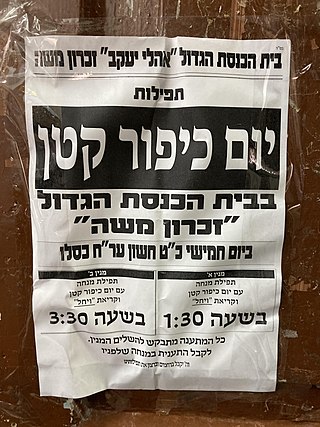
Jewish holidays, also known as Jewish festivals or Yamim Tovim, are holidays observed by Jews throughout the Hebrew calendar. They include religious, cultural and national elements, derived from three sources: mitzvot, rabbinic mandates, the history of Judaism, and the State of Israel.
Shemini Atzeret is a Jewish holiday. It is celebrated on the 22nd day of the Hebrew month of Tishrei in the Land of Israel, and on the 22nd and 23rd outside the Land, usually coinciding with late September or early October. It directly follows the Jewish festival of Sukkot which is celebrated for seven days, and thus Shemini Atzeret is literally the eighth day. It is a separate—yet connected—holy day devoted to the spiritual aspects of the festival of Sukkot. Part of its duality as a holy day is that it is simultaneously considered to be both connected to Sukkot and also a separate festival in its own right.
Moed is the second Order of the Mishnah, the first written recording of the Oral Torah of the Jewish people. Of the six orders of the Mishna, Moed is the third shortest. The order of Moed consists of 12 tractates:
- Shabbat: or Shabbath ("Sabbath") deals with the 39 prohibitions of "work" on the Shabbat. 24 chapters.
- Eruvin: (ערובין) ("Mixtures") deals with the Eruv or Sabbath-bound - a category of constructions/delineations that alter the domains of the Sabbath for carrying and travel. 10 chapters.
- Pesahim: (פסחים) deals with the prescriptions regarding the Passover and the paschal sacrifice. 10 chapters.
- Shekalim: (שקלים) ("Shekels") deals with the collection of the half-Shekel as well as the expenses and expenditure of the Temple. 8 chapters
- Yoma: (יומא) ; called also "Kippurim" or "Yom ha-Kippurim" ; deals with the prescriptions Yom Kippur, especially the ceremony by the Kohen Gadol. 8 chapters.
- Sukkah: (סוכה) ("Booth"); deals with the festival of Sukkot and the Sukkah itself. Also deals with the Four Species which are waved on Sukkot. 5 chapters.
- Beitza: (ביצה) ("Egg"); deals chiefly with the rules to be observed on Yom Tov. 5 chapters.
- Rosh Hashanah: deals chiefly with the regulation of the calendar by the new moon, and with the services of the festival of Rosh Hashanah. 4 chapters.
- Ta'anit: (תענית) ("Fasting") deals chiefly with the special fast-days in times of drought or other untoward occurrences. 4 chapters
- Megillah: (מגילה) ("Scroll") contains chiefly regulations and prescriptions regarding the reading of the scroll of Esther at Purim, and the reading of other passages from the Torah and Neviim in the synagogue. 4 chapters.
- Mo'ed Katan: deals with Chol HaMoed, the intermediate festival days of Pesach and Sukkot. 3 chapters.
- Hagigah: (חגיגה) deals with the Three Pilgrimage Festivals and the pilgrimage offering that men were supposed to bring in Jerusalem. 3 chapters.
Hallel is a Jewish prayer, a verbatim recitation from Psalms 113–118 which is recited by observant Jews on Jewish holidays as an act of praise and thanksgiving.
A seudat mitzvah, in Judaism, is an obligatory festive meal, usually referring to the celebratory meal following the fulfillment of a mitzvah (commandment), such as a bar mitzvah, bat mitzvah, a wedding, a brit milah, or a siyum. Seudot fixed in the calendar are also considered seudot mitzvah, but many have their own, more commonly used names.
Isru Chag refers to the day after each of the Three Pilgrimage Festivals in Judaism: Pesach, Shavuot and Sukkot.

The Jewish Museum of Maryland is located in Baltimore, Maryland, United States. The museum tells the story of the American Jewish experience in the city of Baltimore and throughout the US state of Maryland.

Pesikta Rabbati is a collection of aggadic midrash (homilies) on the Pentateuchal and prophetic readings, the special Sabbaths, and so on. It was composed around 845 CE and probably called "rabbati" to distinguish it from the earlier Pesikta de-Rav Kahana (PdRK).
Special Shabbatot are Jewish Shabbat days on which special events are commemorated. Variations in the liturgy and special customs differentiate them from the other Shabbats and each one is referred to by a special name. Many communities also add piyyutim on many of these special Shabbatot. Two such Shabbats, Shabbat Mevarchim—the Shabbat preceding a new Hebrew month—and Shabbat Rosh Chodesh can occur on several occasions throughout the year. The other special Shabbats occur on specific sabbaths before or coinciding with certain Jewish holidays during the year according to a fixed pattern.
Lists of holidays by various categorizations.
In Judaism, when the Eve of Passover falls on Shabbat, special laws regarding the preparation for Passover are observed.
The modern Hebrew calendar has been designed to ensure that certain holy days and festivals do not fall on certain days of the week. As a result, there are only four possible patterns of days on which festivals can fall.

Rosh HaShanah is the New Year in Judaism. The biblical name for this holiday is Yom Teruah. It is the first of the High Holy Days, as specified by Leviticus 23:23–25, that occur in the late summer/early autumn of the Northern Hemisphere. Rosh Hashanah begins ten days of penitence culminating in Yom Kippur, as well as beginning the cycle of autumnal religious festivals running through Sukkot which end on Shemini Atzeret in Israel and Simchat Torah everywhere else.
On Yom Tov the Torah is read during Shacharit services.

Yom Kippur Katan, is a practice observed by some Jews on the day preceding each Rosh Chodesh. The observance consists of fasting and supplication, but is much less rigorous than that of Yom Kippur proper.
Bein hazmanim refers to vacation time in Jewish yeshivas. Bein hazmanim generally correspond to the major Jewish holidays, and are periods during which official studies are suspended and students typically leave the yeshiva setting. Bein hazmanim blocks divide between the three major yeshiva zmanim(semesters)—the Elul zman, choref(winter)zman, and kayitz(summer)zman. The summer zman is sometimes referred to as the "Pesach zman"—particularly in yeshivas that end their semesters prior to, or at the very beginning of, the summer rather than on Tisha B'Av.
Yom tov sheni shel galuyot, also called in short yom tov sheni, means "the second festival day in the Diaspora". This is a principle in halakha that mandates the observance of an additional day for Jewish holidays outside the Land of Israel.
Sfeka d'yoma is a concept and legal principle in Jewish law which explains why some Jewish holidays are celebrated for one day in the Land of Israel but for two days outside the Land. The implications of sfeka d'yoma are discussed in Rosh Hashanah 21a and in the commentaries and poskim.
This is a timeline of events during the year 2024 which relate to religion.
Goldschmidt-Fraenkel Machzor, formally known as Machzor According to the Customs of the Ashkenazim in All Their Branches: Including the Western Ashkenazic Rite, Polish Rite and former French Rite is a critical edition of the piyyutim found in the Ashkenazic and French prayer books. Daniel Goldschmidt initiated this project, and after his passing his son-in-law Yonah Fraenkel continued it. This project includes collecting manuscript versions of the piyyutim used in the aforementioned customs, including those piyyutim recited today, as well as those piyyutim recited in the past which did not make it to the age of printing. The machzor includes a commentary to all the piyyutim.